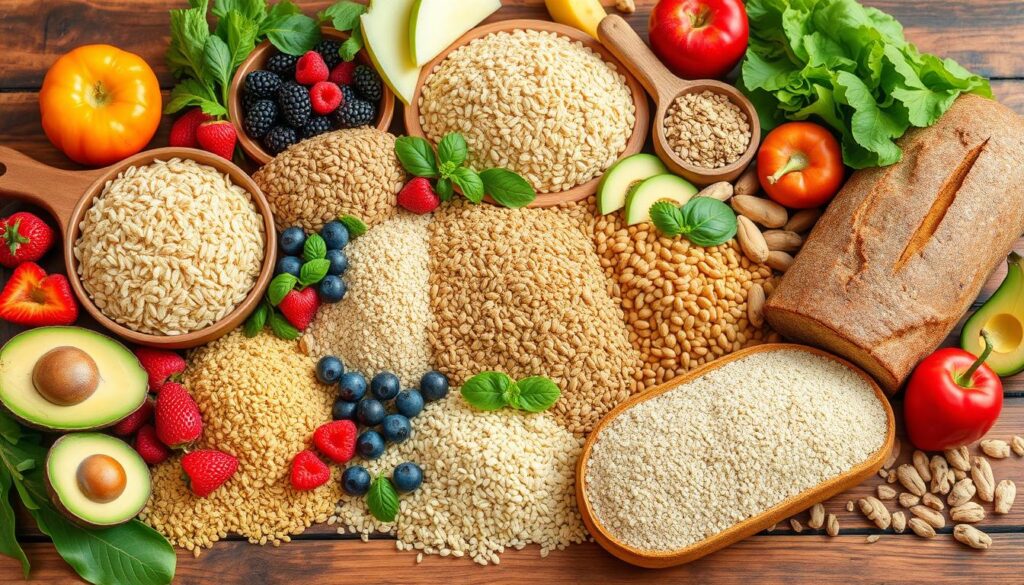Whole grain foods are nutritional powerhouses that can boost your health. They’ve been a key part of human nutrition for thousands of years1. These fiber-rich foods offer amazing health benefits that can improve your overall wellness1.
Eating whole grains can lower risks of diabetes, heart disease, and high blood pressure1. Just three 1-ounce servings daily may cut heart disease risk by 22%1. People who eat the most whole grains see big health gains1.
Whole grains can help you manage weight better. Three servings daily link to lower body mass index and less belly fat1. Swapping refined grains for whole ones might lower your diabetes risk1.
Key Takeaways
- Whole grains offer significant health protection
- Three daily servings can reduce heart disease risk
- Supports weight management and metabolic health
- Helps lower risk of chronic diseases
- Rich in essential nutrients and fiber
Understanding Whole Grain Foods and Their Nutritional Value
Whole grain foods can transform your nutrition approach. These nutrient-packed powerhouses offer more than simple carbs. They provide many health benefits that support your overall well-being2.
Whole grains are nature’s complete nutritional package. They have three key parts: bran, germ, and endosperm. Each part delivers exceptional nutrition3.
Essential Components of Whole Grains
- Bran: The protective outer layer packed with fiber, minerals, and antioxidants
- Germ: The nutrient-dense core rich in vitamins and healthy fats
- Endosperm: The primary source of carbohydrates and proteins
Key Nutrients Found in Whole Grains
Your body gains a lot from whole grain foods. Quinoa, Brown Rice, and Multigrain Bread are great examples. These healthy carbs are full of essential nutrients2.
| Whole Grain | Key Nutrients | Health Benefits |
|---|---|---|
| Brown Rice | Fiber, Magnesium | Supports Digestive Health |
| Quinoa | Complete Protein, Minerals | Boosts Energy |
| Whole Wheat | B Vitamins, Iron | Enhances Metabolism |
Aim to eat at least three servings of whole grains daily. Check the Nutrition Facts label to find real whole grain products2.
“Whole grains are not just food, they’re a cornerstone of a healthy lifestyle.” – Nutrition Experts
Choosing Whole Wheat Products and other whole grains is great for your health. It’s a smart move for your long-term well-being3.
Whole Grain Foods and Their Impact on Health
Fiber-Rich Diets with Whole Grains can boost your health and well-being. Healthy Carbohydrates nourish your body from the inside out4.
Studies show amazing benefits of eating whole grains. Research on whole grain health effects has been growing steadily4.
Key Health Benefits of Whole Grains:
- Weight Management: People eating whole grains burned about 100 more calories daily than those eating refined grains5.
- Improved Immune Function: Whole grain diets can boost infection-fighting immune cells5.
- Heart Health: Soluble fiber may help reduce blood cholesterol levels6.
- Digestive Wellness: Insoluble fiber aids in preventing constipation6.
Pro Tip: Eat at least 3 servings of whole grain foods daily for best health results6.
“Your diet is a bank account. Good food choices are good investments.” – Bethenny Frankel
When shopping, check ingredient lists, not just color. The Whole Grain Stamp helps find products with good whole grain content6.
Small changes can make a big difference. Try whole wheat pasta and whole grain snacks6.
Conclusion
Whole grain foods can revolutionize your approach to healthy carbs. Research shows they significantly impact overall wellness7. Choosing nutrient-rich options like whole wheat flour supports long-term health7.
Prioritize whole grains in your diet for their health benefits. Three daily servings can cut heart disease risk by 22% and stroke risk by 12%7.
Studies show high whole grain intake lowers colorectal cancer risk by 16%7. Be smart when selecting whole grain foods. Not all “whole grain” products are equal.
Read nutrition labels carefully. Aim to make whole grains the main ingredient. A study on dietary patterns stresses the importance of mindful grain choices8.
Whole grain foods are more than just nutrition. They’re a step towards better health. By choosing these healthy carbs, you’re boosting wellness and cutting disease risk.
FAQ
What exactly are whole grains?
How do whole grains benefit my health?
How many whole grains should I eat daily?
What nutrients are found in whole grains?
Are all products labeled “whole grain” equally healthy?
Can whole grains help with weight management?
What are some easy ways to incorporate more whole grains into my diet?
Do whole grains have any potential cancer-prevention benefits?
Source Links
- 9 Health Benefits of Eating Whole Grains – https://www.healthline.com/nutrition/9-benefits-of-whole-grains
- Get to Know Grains: Why You Need Them, and What to Look For – https://www.heart.org/en/healthy-living/healthy-eating/eat-smart/nutrition-basics/whole-grains-refined-grains-and-dietary-fiber
- 14 Healthy Whole-Grain Foods (Including Gluten-Free Options) – https://www.healthline.com/nutrition/whole-grain-foods
- Health Effects of Whole Grains: A Bibliometric Analysis – https://pmc.ncbi.nlm.nih.gov/articles/PMC9777732/
- USDA ARS Online Magazine Whole Grains Deliver on Health Benefits – https://agresearchmag.ars.usda.gov/2018/mar/grains/
- Whole Grain Goodness – Health Promotion – https://healthpromotion.uga.edu/nutrition/whole-grain/
- Everything You Need to Know About Grains In Your Diet – https://www.healthline.com/nutrition/grains-good-or-bad
- Are Whole Grains Optional for a Healthy Diet? Why a New Study Misses the Mark – https://wholegrainscouncil.org/blog/2023/09/are-whole-grains-optional-healthy-diet-why-new-study-misses-mark
